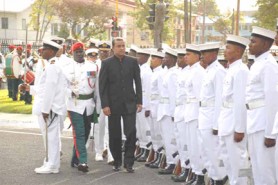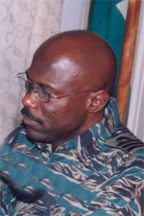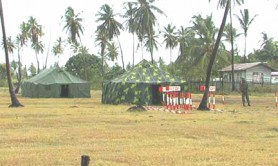The Guyana Defence Force is caught on the horns of a dilemma. Until its operating policies are reviewed and its training techniques are rectified, achieving its mission will be impossible.
The Essequibo River atrocity in which Guyana Defence Force Coast Coast Guard ratings robbed and murdered a gold dealer shocked the nation. But it was not the first serious crime, although it might have been the worst. Numerous disciplinary incidents involving soldiers have beset the Force over the years.
Signals of a serious decline in discipline became evident several years ago but they were dismissed as the isolated acts of a few incorrigibles. As time went by, crimes continued to occur but it seems that there was no incisive investigation to determine causation. At various levels, the conduct of officers, non-commissioned officers and soldiers was deteriorating, suggesting that there were defects in their training and deficiencies in supervision by superiors. These incidents indicated the depths to which operational discipline and tactical doctrine had been sinking yet comprehensive, corrective action was not taken.

It will be recalled that a soldier murdered another during Operation Restore Demo-cracy – the international peace support deployment in Haiti – in 1995. Then elements of the Force took part in a law-enforcement episode involving the unprecedented employment of field support weapons in the siege of a guest house in a residential section of Greater Georgetown in February 2000. An ex-soldier – Linden ‘Blackie’ London – was shot dead in the presence of high-ranking officers.
In other incidents, a commissioned officer was charged for shooting one of his soldiers to death at a hinterland camp. A soldier was found guilty of manslaughter for killing of another soldier at a camp on the East Coast. One soldier was badly burnt when another deliberately set fire to a building at a military camp in the hinterland. Another was arrested over the killing of a soldier in the barracks. Other officers have been implicated in the torture of their own soldiers and several civilian villagers.
Last June, a lieutenant and his soldiers were arrested after an armed robbery at a Brazilian mining camp in the Barima-Waini Region. The same month, a court-martial ordered the dismissal of a young lieutenant for his negligence associated with a boat mishap in the Cuyuni River in which two soldiers died. The losses of aircraft and vehicles and, most notoriously, the theft of three dozen assault rifles from an Ordnance depot in Thomas Lands were, perhaps more egregious examples of lawlessness and criminal negligence.
These events are public knowledge and reports have been published in the press over the years. They suggest that the problems must have existed for a very long time.

Whether as a reaction to these crimes or to the grave security situation on the East Coast which erupted after the 2002 Mashramani jailbreak, President Bharrat Jagdeo has been iterating his intention to reform the Guyana Defence Force. In an article carried in the Stabroek News newspaper in March 2005 titled “Jagdeo signals new roles for army: internal security on agenda”, the President disclosed that the Guyana Defence Board, of which he is the Chairman, was considering various roles that the Force could play. Earlier, he had advised military officers that they would have “new roles” to play and disclosed that there was already a “paper” before the Defence Board proposing “new ways” for the Force to participate in internal security and support the civil authority. He threatened that, if the Defence Act would not allow the Force’s participation, it will be “changed.”
The President added that the Force needed the reforms proposed in the Report of the Disciplined Forces Commission and promised that “there will be a serious discussion to ensure compliance with the recommendations.” He went even further to promise that, once returned to office after the 2006 general elections, he would restructure both the Police and Defence Forces. In his ten-year-long chairmanship of the Defence Board during which he has worked with four Chiefs of Staff, Jagdeo has introduced no serious military reforms.
The Defence Act does indeed prescribe a public order role for the Defence Force and provides the Defence Board with overall responsibility for the administration, command and discipline of the Force. In other words, Jagdeo knows that the Force can be legally employed on internal security operations and there is no need to change the law. He knows also that the Board has the authority to restructure the Force whenever it wants to do so.Chief-of-Staff Commodore Gary Best took a more legal and professional line. In an article “Soldiers are not Police” in the Guyana Chronicle newspaper in early September, he explained that members of the Defence Force “do not have the same powers as members of the Guyana Police Force…They provide security backup when required…When the soldiers perform security duties, they will be involved in Joint Services operations where they are asked by the police to provide support…They may not act independently…They are not there to carry out policing functions. That is for the police to do.”

Best iterated that the Defence Force performed two distinct duties − defence and security − pointing out that patrols in the hinterland and on the borders could be regarded as defence duties while security duties were those performed in support of the Police. Such a supporting role, Best said, required soldiers to provide only a safe environment in which the police carry out their functions. Once that safe environment was created, the police would be enabled do their work and the soldiers need not be there. He stated categorically that soldiers “may not act independently…They are not there to carry out policing functions. That is for the police to do.”
The Defence Force, of course, has always performed multiple tasks. By the early 1990s, this administration inherited an Air Corps with the capability to undertake casualty evacuation and search-and-rescue missions; an Engineer Corps which possessed the resources to assist Caribbean countries damaged by hurricanes; a Coast Guard that could have pursued poachers, protected fishermen from pirates, and interdicted fuel smugglers and narco-traffickers and Ground Forces that were capable of participating in an international peace support operation in Haiti and to support the local police. In addition, a Reserve Force − then called the Guyana People’s Militia − was deployed throughout all the country where it could render assistance to the regional administrations in times of floods, threats to public order and other emergencies.
By calling out the Defence Force to establish a military encampment in a civilian community and perform strictly law-enforcement tasks on their own when the Troubles broke out on the East Coast, Jagdeo signalled his determination to involve soldiers in combatting crime. He had to be aware that law enforcement and quelling disorder are the duties of the Guyana Police Force and only as a last resort in emergencies when the Police had exhausted its resources and its reserves should the Defence Force be called out.
It is a common but nonsensical myth among politicians that unless the Defence Force is involved with helicopters in the air and platoons of troops dashing around the countryside rounding up suspects, counter-crime operations cannot be effectual. Experience has shown, however, that Guyana’s gangs have tended to attach themselves to the underground economy, settle into neighbourhoods, develop logistical support relations with sympathetic residents and operate by stealth.
It is the Police Force, with its countrywide network of permanent stations, greater manpower, relatively more proficient law enforcement capabilities and continuous civilian connections and close relationship with the criminal justice system that has the superior ability to disable criminal networks far more effectively than the Defence Force. The Police Force is equipped with the Special Branch to provide intelligence, the Criminal Investigation Department to conduct investigations and the Tactical Service Unit to conduct operations has the greater capability.
The Police Force has specific responsibility under the Police Act for “The prevention and detection of crime; the preservation of law and order; the preservation of the peace; the repression of internal disturbance; the protection of property; the apprehension of offenders; and the due enforcement of all laws and regulations with which it is directly charged…” There is no way that the Defence Force can be expected to perform these tasks.
With all its deficiencies, the Police Force is immeasurably superior to the Defence Force in the field of law enforcement. It has been a mistake to think that the two forces are interchangeable, or worse, that the Defence Force could conduct major counter-crime operations. Further, the law gives certain powers, and training imparts certain prowess, to the policemen – to arrest, search, interrogate and prosecute – which soldiers do not possess. Although the two forces have operated jointly on several occasions in the past, these occurred only after prolonged periods of joint training, the setting up of joint operations centres which often included the co-location of troops with policemen in police compounds and, most of all, a clear definition and separation of duties and roles.
The Defence Force could be employed more effectively on defence tasks such as patrolling the country’s land frontiers and preventing foreign aircraft from landing huge cocaine shipments on hinterland roadways and airstrips. By demanding that the defence Force be deployed on police duties, the real task of defending Guyana will be left undone!
Dilemma
The administration has created a security dilemma where none should exist. On the one hand, the over-deployment of the Defence Force on coastal law-enforcement tasks has stunted the growth of the Police Force which should have filled this role. On the other hand, it has depleted the military units available for border security duties and hampered military training. Prolonged misuse of the Defence Force on law-enforcement duties – which involved the uninvestigated killing of civilians, the unauthorised searching of private homes and the unlawful arrest and interrogation of suspects – have had deleterious effects on the behaviour of military personnel which has become manifest in criminal conduct.
Acknowledging some of the Force’s most egregious failures, Colonel Bruce Lovell in December 2007 referred to the numerous other acts of indiscipline that landed several soldiers in the civil courts to answer charges for serious crimes including murder. He suggested then that there needed to be a “paradigm shift” in the Defence Force’s approach to security and a “revolution” in its professional culture.
Lovell declared that “We have to radically redesign our processes to be true to our mandate and this therefore impels us to critically examine issues such as our roles, our doctrine and our force structure and organization.” He noted, moreover, that a fundamental aspect of the paradigmatic shift would be in the force’s approach to training. This was especially appropriate in light of the fact that the misconduct of young officers and junior soldiers reflected the inadequacies and deficiencies of their training.
The facts are that although there has been a dangerous decay in individual discipline which could be blamed on the incorrigibility of a few felonious soldiers, misbehaviour has also been a reflection of institutional problems arising out of the type of training officers and soldiers receive on enlistment and the quality of administration and command prevailing in the Force. Most of all, many of the crimes seem to have sprung from the extraordinary employment of the Defence Force in a law-enforcement role for several years. This, together with other factors, eroded the Force’s professional ethos.
In the final analysis, it is the Guyana Defence Board that has directed the Defence Force for the past 17 years and which must bear the responsibility for the Force’s current problems. This fact should oblige it to confront the contradictions in the employment and deployment of troops, rethink its defence policy and once again enable it to put the Guyana Defence Force back on the road to achieving its mission.

